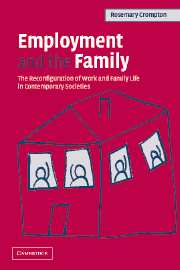Book contents
- Frontmatter
- Contents
- Preface
- 1 Understanding change in employment, family and gender relations
- 2 Caring and working
- 3 Women, men, organisations and careers
- 4 Work–life articulation, working hours and work–life policies
- 5 States, families and work–life articulation
- 6 Households, domestic work, market work and happiness
- 7 Class, family choices and women's employment
- 8 Conclusions
- Appendix A Additional ISSP Family 2002 questions
- Appendix B Joseph Rowntree Foundation (JRF) interviewees cited
- Bibliography
- Index
2 - Caring and working
Published online by Cambridge University Press: 22 September 2009
- Frontmatter
- Contents
- Preface
- 1 Understanding change in employment, family and gender relations
- 2 Caring and working
- 3 Women, men, organisations and careers
- 4 Work–life articulation, working hours and work–life policies
- 5 States, families and work–life articulation
- 6 Households, domestic work, market work and happiness
- 7 Class, family choices and women's employment
- 8 Conclusions
- Appendix A Additional ISSP Family 2002 questions
- Appendix B Joseph Rowntree Foundation (JRF) interviewees cited
- Bibliography
- Index
Summary
‘Families’ and ‘employment’ are inter-related, socially constructed, phenomena via which the division of labour between men and women is organised, and social production and reproduction thereby achieved. In this chapter, a brief historical description of the emergence of the ‘modern’ family in Britain, together with associated patterns of moralities and normative beliefs relating to ‘the family’, will be given. We will also examine recent transformations in these arrangements, as well as their state of contemporary flux, focusing on the changing pattern of men's and women's employment within couple households. We will also look more closely at changing attitudes to the family, gender roles and women's employment. In particular, recent debates addressing the question of whether mothers in Britain have ‘chosen’ to take up paid work or not will be examined in some detail.
‘Modern’ family theory
The functionalist theory of the ‘modern’ (or ‘standard’) family was a key element of the ‘orthodox consensus’ (Giddens 1982; Cheal 1991) that emerged in sociology after the Second World War and persisted until the 1970s and even the 1980s. This model (as developed by e.g., Parsons 1949; Goode 1964) viewed the family as an institution that fulfilled universal prerequisites for the survival of human societies. The smooth functioning of societies, it was argued, depended on the proper articulation of the interdependent parts. Therefore as societies change, so will families change to meet new needs.
- Type
- Chapter
- Information
- Employment and the FamilyThe Reconfiguration of Work and Family Life in Contemporary Societies, pp. 31 - 61Publisher: Cambridge University PressPrint publication year: 2006

